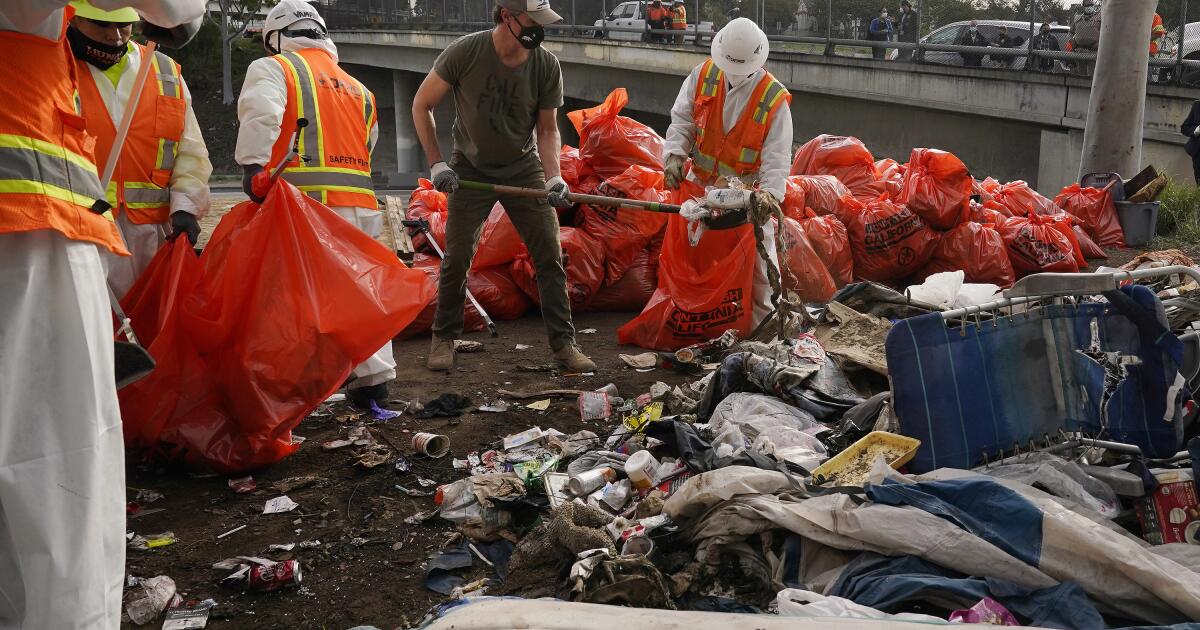What does a small, solidly Republican city in Oregon have in common with California’s largest liberal enclaves? All breathed a sigh of relief this year thanks to the far-right U.S. Supreme Court.
The court’s conservative bloc ruled in favor of the city of Grants Pass, Ore., in June, overturning a key lower court ruling on homelessness and clearing the way for local governments to crack down on sleeping in public spaces regardless of the availability of housing or shelter. California’s response to the ruling has become a vivid reminder of not just the intractability of the homelessness epidemic but also the tension between national liberal politics and local policy in Democratic-dominated states and cities.
Some 186,000 people across California lack consistent shelter. Roughly 84% of the state’s voters believe homelessness is a “very serious” problem, a Quinnipiac University poll found, and Democrats and Republicans were in similarly broad agreement on that assessment, at 81% and 85%, respectively. In that light, it’s not surprising that California officials have wasted no time since Grants Pass in implementing their preferred “solution” to the homelessness problem.
From San Diego to San Francisco, state and local workers began disassembling makeshift shelters and camps and displacing the homeless people living in them. Within days, entire blocks were remade across the state. Residents rallied to social media platforms such as Reddit and Nextdoor to exchange strategies for getting homeless encampments removed from their own neighborhoods.
Other California residents have taken the Supreme Court’s ruling and Democratic officials’ exuberant co-sign as further evidence of the nation’s growing disdain for society’s most marginalized. Reports spread of homeless people being ejected from campsites with little or no warning, their pets taken away and medications lost, among other indignities.
The American Civil Liberties Union and other advocacy groups have condemned the Grants Pass ruling. The chief executive of the National Alliance to End Homelessness said it set a “dangerous precedent.” But the precedent set by California Democrats has arguably been far more dangerous.
During the initial waves of the Golden State’s housing crisis, in the late 1970s, Democratic politicians were reluctant to be seen as overtly antagonistic to the state’s homeless people, many of them veterans of the nation’s wars in Vietnam and Korea. But as the homeless population has grown and diversified, officials have faced deepening NIMBY sentiment not just in California’s well-heeled liberal cities but also in Democratic-leaning working-class communities that increasingly experience the highest rates of homelessness and related problems such as loitering and blight. As a result, anti-homeless policies have become more politically appealing despite being painfully at odds with inclusivity and other virtues Democrats signal on the national stage.
Addressing the housing crisis has been a quintessential and enduring social justice cause for Democrats, encompassing themes that tend to unify the party, including health, economic and racial equity. According to one survey, 82% of homeless adults in California reported having experienced a serious mental health condition, and 65% had used illicit drugs at some point. The state’s Black people are disproportionately affected by homelessness: Despite making up only about 5% of California’s total population, they represent roughly 25% of its homeless people. Such statistics helped liberals frame homelessness as a product of Republican policies weakening social services and promoting unchecked capitalism.
But that view has lost support as homelessness has become more dramatic and visible over the last decade. In some of California’s liberal enclaves, homeless encampments have become full-blown tent cities. Scenes of squalor, drug use and petty crime have spawned a subculture of gonzo-style documentary videos racking up hundreds of thousands of views on YouTube. San Francisco and Los Angeles have the most prominent crises, inviting scrutiny of the latter city’s readiness to host the 2028 Olympics.
Democrats’ conundrum is whether authorities should roust, fine and imprison people residing in public spaces in the interest of answering the broader community’s quality-of-life concerns. Critics have argued that such criminalization is a cruel distraction and that more affordable housing is the only way to meaningfully address the crisis.
Gov. Gavin Newsom and his predecessor, Jerry Brown, devoted billions of dollars to homelessness prevention and affordable housing even as the homeless population generally continued to grow. Newsom was quick to seize on the conservative Supreme Court’s permission to put punishment ahead of housing, warning cities that if they don’t remove encampments, they risk losing state funding. San Francisco Mayor London Breed, who just lost a reelection bid partly because of concerns about homelessness, likewise promised to be “very aggressive” in removing encampments. Never mind that those displaced by the state’s homeless sweeps often end up occupying another nearby space and returning at a later date.
So how did we get here? California’s ruling Democrats have tried to have it all ways, largely cultivating and tolerating deeply bureaucratic housing development standards while amplifying a booming tech industry populated by employees willing to pay top dollar for homes, dramatically boosting prices. And although Newsom and others have heralded emergency housing and other measures to answer the crisis, the total capacity is far short of the unhoused population. That’s partly because new facilities are often rebuffed by cities such as the L.A. suburb of Norwalk, which recently enacted a moratorium on homeless shelters.
Reducing and preventing homelessness, whatever the underlying motivations, is one of the few civic concerns that bind the political parties together in an age of stark polarization. Beyond the obvious moral merits of the cause, it could provide a road map to arrive at bipartisan solutions for other challenges facing the state and country. Unfortunately, the consensus on homelessness is coalescing around a prescription with little chance of long-term success.
Jerel Ezell is an assistant professor of community health sciences at UC Berkeley.




